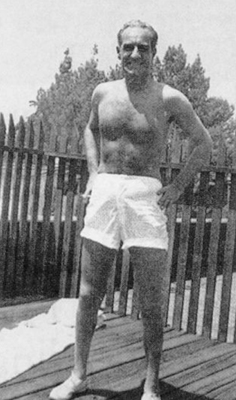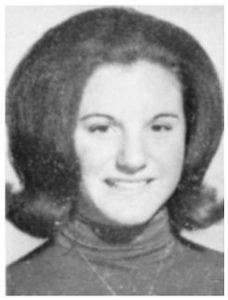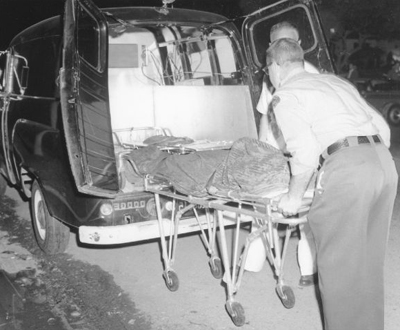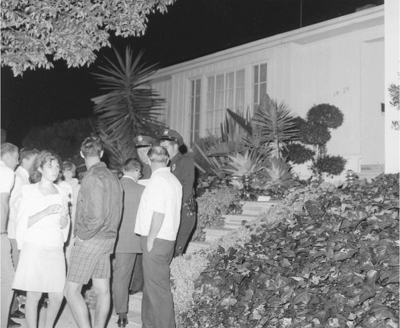Destination (4 page)

His condition horrified and repulsed me. I saw his death as my abandonment and my own death decades hence. I started prepping for life solo. I started shutting him out.
He spent three weeks at the VA Hospital. His condition and survival prospects improved. I ditched school every day. I bike-looped L.A. I swiped nudist magazines. I visited my dad. I watched episodes of
The Fugitive.
They ticked time to the JFK hit. I recall the plotlines and the guest-star women still.
My dad split the VA on hit day. Jack's death and the attendant hoo-ha bored him. Ditto for me. Fuck Jack. We were Republicans and Protestants. Jack took his orders from Rome. The fruit cop almost nabbed Kimble that Tuesday. Patricia Crowley's red hair beamed in black-and-white.
MY DAD RETRIEVED IT. My dad blew it anew. I distanced myself. I sabotaged out of his grasp.
He resumed smoking. He resurrected his high-salt/high-fat diet. I ditched school most days. I flunked the 11th grade. I bike-roamed. I watched
The Fugitive
and read crime novels. I brain-screened crime fantasies. I eyeballed rich girls and their fortyish moms throughout Hancock Park.
Obsession suited me. My
self-
obsession blinded me to extraneous social trends. America mourned Jack the K. It was fodder for my Nazi shtick and no more. LBJ goosed the Vietnam troop count. I stumped for nuclear war. A store cop detained me for shoplifting. My dad had a heart attack as I sweated custody. The Jack-hit aftermath metastasized. Conspiracy talk bubbled up. My feelers perked. I dug the inherent mystery. I brain-screened Dallas scenarios for Doc Kimble. Jackie Kennedy was June Harding for the poor.
The blur heightened. School became a nonendurable drag. I was seventeen. I was white. “Free” would make it the trifecta. I stepped up my Nazi antics. I got suspended from class for a week. My dad started calling me “you kraut cocksucker.” I painted swastikas on the dog's dish. My dad wore a Jewish beanie to torment me.
I returned to school. I juiced the escape process. The Folk Song Club met. I regaled and disrupted with a pro-Nazi tune and a chorus of the “Horst Wessel Lied.”
They expelled me. It was midweek in mid-March of 1965. I walked south on Fairfax. I've got the details memorized.
The smell outside Canter's Deli. School kids sneaking cigarettes. The old Jews headed for shul.
I hitched home on Beverly Boulevard. I felt airless and scared. I got a jolt of destiny. High-school dropouts were fucked. I'd better become a great writer fast.
THE NOTION HELD. I stalled the work. My wacked-out education continued.
Future writers hide inside books and snort up the craft by enjoyment. They read and learn structure and style. Their curiosity points them to subject matter. They read to titillate and edify. They scratch the itch to see life revealed. They swing on an I-can-do-this/I-can't-do-this tether. The novel form awes them. The soapbox aspect entices. A sense of potential accomplishment looms. The novel is autobiography mislabeled. The novel avenges sand kicked in the face and larger and more longstanding trauma. The novel enraptures career losers with justifying visions of self. The novel itemizes and encapsulates experience and contains it within a worldview. The novel takes abstraction and turns it to dramatic incident. The novel makes incident specific and loftily abstract. The novel explicates moral concerns to the novelist himself and reveals them through his dramaturgical choices. The novel bestows a huge ego on the novelist and jerks him to humility concurrent. The novel is a big fucking endeavor. The puzzle-cube aspect of the novelist's gift always stuns.
Novelists mold memories and conceits. Their images replace colored blocks and click to cohesion. Plumb lines appear. They take what they need and what they were and sift it through what they've become. Their voices build off a mute state often nurtured in recklessness and privation.
The novel is a daunting task. It takes some building up to. My prelude took fourteen years.
I dawdled postâhigh school. I nursed an urge to blow town. My dad let me join the Army. My dad had a second stroke my second day in. I exploited his condition. I faked a nervous breakdown.
The Army scared me shitless. I hated the discipline. I was a craven and seditious faux führer. I did not want to go to Vietnam.
I got an emergency leave. I visited my dad on his deathbed. His last words to me: “Try to pick up every waitress who serves you.”
The Army cut me loose. I was parent- and draft-free at age 17. I got a jolt of destiny. Teenage orphans were fucked. I'd better become a great writer fast.
“Fast” is relative. Fourteen years runs relative against a lifetime. “Great” is relative. It's often a self-bestowed or posthumous tag.

Ellroy's father, Lee.
(Photo courtesy
of James Ellroy)
It was time to live and read. It was time to complete my picaresque education.
I matriculated in L.A. I majored in booze and dope and minored in random desiccation. I read a shitload of crime novels and true-crime books and eschewed “mainstream” literature. I ate up plot, structural density and character development through implication. I judged books by their human content and authenticity. I made qualitative judgments and dropped further analysis. I possessed no gift to gauge abstraction. It was pure assimilation. I lived in a fictional criminal universe and brain-screened criminal fantasies. I committed petty crimes out of sloth and moral default. I shoplifted food, booze, and books. I stole empty pop bottles from reclamation bins. I broke into apartment-house laundry rooms and pried coins out of washers and dryers. I stalked Hancock Park girls, broke into their pads, and sniffed their underwear. I did county-jail time. I hobnobbed with other jejune jerkoffs and Mickey Mouse misdemeanants. We lied about our beaucoup bitches and criminal exploits. I honed my nascent narrative skills via jerry-rigged jailhouse jive.
That was narrative output. Bullshit sessions rife with brag. I spritzed to cellmates and my nonjail pals. I chose my words deftly. I put the art in bullshit artiste. My themes were crime and my indigenous lunacy. I knew what I vibed. I did not try to undermine the perception. I knew that candor would hold my audience. I knew that macho posturing would discredit me. I understood the rules of verisimilitude. I worked off my outré appearance. I was 6â²3â³/140â60 pounds of it zits, and always the ripe snout pustule.
Most kids riffed off machismo and politics. The era mandated topical discourse. Winning fistfights and Us-versus-Themâ“the Establishment” as punching bag.
I detailed my
losing
fistfights. John “the Whale” Blackman falls on me at John Costa's pad. I enter a booze blackout. I wake up bruised in a Christmas-tree lot. There's the Mex drag queen Peaches at the “New” County Jail. Peaches gropes my knee. I pop him. Peaches has heavy hands like Alexis Arguello. Peaches pounds me.
“The Establishment”? Fuck that. Counterculture rage denotes a new conformity. Every puerile street punk hates the Establishment. Their critique is short on analytical rigor and long on personal pique. Street punk Ellroy knows this. He can't quite voice it epigrammatically. He's a neoconservative crashing in parks and Goodwill bins. He craves women like then-unknown Peggy Noonan. He's got a not-quite-acknowledged moral ace up his sheeve.
Goofball Ellroy rarely thinks in abstractions. Goofball Ellroy feels this:
He created his own shit. The Establishment did not fuck him. He made his own choices. He plumbed his own course. He
engaged
his own shit.
Weird shit.
Gooooood
shit. Painful shit compounding at a horrible cost. Righteous shit for future pages.
The '60s and '70s bopped forth. I bopped forth heedlessly. I got drunk. I got bombed. I ragged the counterculture and their candy-ass angst. I surfed their dope tide. I failed to note the contradiction.
I ate Benzedrex Inhaler wads. I drank Romilar CF cough syrup. I scored uppers off a fruitfly named Gene the Short Queen. I mainlined Methedrine. I grazed on grass. I lurked, loitered, listened, and
learned.
I nabbed the noxious
Nachtmusik
of my far-out fatherland. Crime crystallized crisp in my cranial cracks.
There's L.A. It's epidemically everywhere. It's a circumscribed circus and draconian dream. It's a lavish land of caveman cops, shakedown shills, and jungle-bred junkies. It's a hyperbolic whorehouse and a hip hermaphrodite hutch. It hops on its hind legs and howls. It's a blistering blur blowing its way right through me.
I
lurked.
I dug a preppy girl named Margaret Craig. I tooled by her two-story Tudor crib and love-looted it voyeur-style. I
loitered.
I stood stock-still and stared in wide windows. I
listened.
I vacuumed up verbal verities verbatim. I
learned.
My odious orbit offered up insinuating insight. It demystified and dedoctrinized.
Bamâthere's the LAPD. I'm in their custody. I pass through drunk tanks and the “Glass House.” My lie detector clicks in and climbs counterclockwise. I look. I
learn.
I know they're not evil. They've been media-mauled and damningly demonized.
BamâI'm in jail again. I'm bored. I'm alert. I'm scared. I look. I
learn.
I listen to the language of lowlife lassitude. It's rancid rationalization. I could have been/I should have been/they
owe
me.
Society
made me corrupt.
BamâI meet a duo named Solly and Joan. We toke Thai stick and talk. Solly's handsome and weak. Joanie's joined to him in gender-role jive and juvenile lust. She knows he's lost/she knows he won't change/she hangs on nonplussed. She's sunk by stuff outside her volition. Women always get fucked.
I learned. I retreated and read.
I read Dashiell Hammett at the downtown library. I read Ross Macdonald by flashlight in the parks. I read meretricious crime writers all over L.A. I read Jolting Joe Wambaugh in jail and out.
The New Centurions/The Blue Knight/The Onion Field/The
Choirboysâ
visionary work by a cop. L.A. revised. Authoritarian-ism dissected. Authority sanely lauded over chaos. A
counter-
counterculture view of 1960 up. Absurdism sans leftist drill. A horrible compassion and indictment of moral default.
Wambaugh burned through me. Wambaugh made me dredge abstractions and spin epigrams. Wambaugh made me think what it all meant.
Wambaugh sang me a swan song. Wambaugh changed me forever. Here's how I know that:
He made me ashamed of my life.
NOT ENOUGH TO change it. Close, but not yet.
It took more lunacy and more bad behavior and a large pus sac on a lung. It took more books read, more books gauged, more books consciously assessed. It took more self-disgust and more destiny jolts and more ache to be someone.
I was Don DeLillo's Lee Harvey Oswald writ pit-faced and tall. I had a “far mean streak of independence brought on by neglect.” It was self-neglect entirely. I merged with Bad Lee in desperate yearning and diverged with him in design. Smudge history or rewrite it to your own specifications? No contest at all. Lurk outside Margaret Craig's window or seek flesh-and-blood women? All bets are off.
I cleaned up in '77. I was 29. Chronology favored me. I survived my picaresque education. Survivable drugs and low street-crime stats stood on my side. Jail tiers were bereft of gangbangers and race cliques. Scared kids with poor survival skills could endure and learn.
Learning is a motherfucker. I learned the hard way. I don't recommend it. Outrageous circumstance nailed me. I cultivated the gift and curse of obsession. The gift finally won.
I changed my life. I credit Almighty God with the save. I disowned profligacy. I sought righteousness. I swooned to write books. Literature is a deep calling. I knew it at the depth of my shame.
It's been goodâand it's nowhere near over. Now I learn from
my
words on the page. I dig the mystical aspect. My weird shit out in the
spiritus mundiâ
particles popping in air.
There's a kid or some kids somewhere. I'll never know them. They're particle-puzzle-cubing right now. They might be mini-misanthropes from Moosefart, Montana. They might be demidystopians from Dogdick, Delaware. They dig my demonic dramas. The metaphysic maims them. They grasp at the gravity. They'll duke it out with their demons. They'll serve up a surfeit of survival skills. They won't be chronologically crucified.
They'll shore up my shit. They'll radically revise it. They'll pass it along.
Stephanie
Murder files hook you fast and drag you in slow. The crime-scene report wires shock. Read it for facts and milieu.
Don't extrapolate. Don't expect clear explication. Big files fill
ten boxes. Logic builds and fractures. Chronologies disperse.
The act creates the disorder. It leads you to the victim slow.
Summary reports, Teletypes, mug shots. Non sequitur
license-plate stats. Ding-farm runaways polygraphed and
shipped to Camarillo. The polygrapher's negative stats.
FI cards. Street creeps braced and cut loose. Shredded
APBs. Canvassing sheets. Wrong-case misfiles, mug-run
cards, and rap sheets.
Family photos. The victim's address book. Her scent or your
wish fulfillment of it many years old. Snapshots of her smiling, posed in out-of-date clothes.
Women only. They make me read and look. Old paper as
perfume. Longing as perceptive tool.
Unsolved files only. Apply your mind male and rude. Reset
fractures. Reroute narrative. Make data blips cohere.
I've read a dozen murder files. I started with my mother's
file and moved on. I read unsolved/female/sex-murder files
only. I'm not a detective. I'm not a cop wannabe. I've never
solved a crime. I come to know the women sometimes.
I study the death pictures. I always do it first. Take me back
and show me the horror. Make me feel your loss fresh and
new.
DETECTIVE BUREAU/HOMICIDE DIVISION/LOS ANGELES POLICE DEPARTMENT. DR# 65-538-991 [MURDER/187 PC]. VICTIM: STEPHANIE LYNN GORMAN/WHITE FEMALE/AGE 16. DOB: 6-11-49. DOD: 8-5-65. STATUS: UNSOLVED/REOPENED/LAPD UNSOLVED UNIT AT WORK.
The crime scene:
West L.A./“Beverlywood”/southeast of Beverly Hills. Upper-middle-class Jewish/all residential/crime stats down around zilch.
A corner house. Hillsboro and Sawyer. Stucco/late-'40s vintage/three bedrooms, pristine. A rear garage. Side-street access. A cement backyard. A five-foot connecting wall. A street-access wood door set in.
A backyard patio. Two chaise lounges. Sliding-glass doors that lead in. A rumpus room. A patio view. A side hallway. Go to the northeast bedroom.
It's by the front door. Windows look out. You see the front lawn and street. You see the house next door.
A door leads to the master bedroom. A door leads to the hall. Roll 37 years back. Pop the doors and LOOK.
It's a small room. It's a girl's room. It's the older sister's pad. A west-wall dresser. A north-wall desk by the window. Daybeds line the south and east walls. They hit perpendicular. An end table separates them. A lamp and knickknacks sit upright. There's a cold-cream jar lid in between. There's a matchbook on the floor. There's a nightstand in the northeast corner. There's a knocked-over lamp. There's an east-wall portrait. It's bright oil paint. It's the older sister beaming. There's a stuffed turtle toy on the east bed. Both bed covers are lime green.

Stephanie Lynn Gorman as seen in her Hamilton High School yearbook photo, freshman year, 1965.
(Los Angeles Times Collection,
Department of Special Collections,
Charles E. Young Research Library,
UCLA)
On the floor: two gray sweat socks. Close by: a lidless jar of cold cream. Gauge in. They're beside the south bed and matchbook.
A chair by the connecting doors. Clothes under it: panties, denim shorts, one tennis shoe. Gauge in. The matching shoe is on the floor. It's near the west-wall dresser.
There's a cord looped to one south-bed leg. It's white chalk line. It's mason's cord. The free end is frayed. There's a shell casing on the floor. It's between the wall and the south bed. By the east bed: three more shell casings.
Bloodstained carpet. It's near the east bed. It's between the outer edge and the shell casings.
The casings are small. The cord is loose-weaved and three-stranded. The bloodstain is red and bright pink.
There's Stephanie Gorman.
She's on the floor. She's on her knees. She lists against the east wall. She's by the east-bed foot.
She's half-nude. She's bottomless. She's wearing a knit top and bra. They're knife-slashed up the middle. The top hangs loose. The bra hangs off her neck and shoulders.
Drag burns on her right hip. Both wrists abraded. Cinched cord on her right wrist. Loose strands pressure-frayed.
Gunshot wounds:
Two in her chest. One in her neck. One in her forehead.
Her lower lip and left breast are bruised. Her inner lip is swollen. Her forehead sustained a contusion.
She's in a begging pose. She's against that wall. Bullet force bruised her back. The east wall got an indentation.
It happened in broad summer daylight.
HER FATHER and sister found her.
6:00 p.m., 8/5/65. Ed and Cheryl Gorman come home. Cheryl's bedroom door is shut. They open it. They enter the room. They see Stephanie.
Ed Gorman goes to her and lifts her. He puts her on the east bed. He covers her with a quilt and some clothing. He calls LAPD. West L.A. Division responds.
Stephanie's mother came home. Ed Gorman told her. The LAPD arrived.
Lieutenant Grover Armstrong. Detective Sergeants Robert Byron and William Koivu. SID men, latent print men, photo lab men, crime lab men. Ten LAPD men total.
The detectives talked to the family. The family said this:
Ed Gorman was a lawyer. He had an office downtown. Cheryl worked for him today. Julie Gorman was a housewife. She played tennis today. She came home at 3:00 p.m. She saw Cheryl's bedroom door shut. She paid no attention.
She went back out. She went to the beauty shop. She came home to
this.
The tech men fanned out. The detectives studied the crime scene. The photo men took pictures. Ed Gorman said he disrupted the scene. He covered Stephanie. She's up on the east bed. Her head's brushing the toy turtle.
The cops walked the house. They saw no forced entry. They saw no ransacking. They found a cord strand near the front door. They walked the patio. They found two bloodstained towels. They were on a chaise lounge.
The detectives talked to the family. They rebuilt Stephanie's day.
She went to Hamilton High summer school. It was one mile away. She carpooled with two friends: Paul Bernstein and Ilene Jackman. They always left school at 12:30.
The detectives called Ilene Jackman. They told her. They calmed her down. They learned this:
Yes, they went to school. Yes, they drove home. They dropped Paul off first. She dropped Stephanie at 12:45. Stephanie walked through the back gate.
She's in the house now. She's there
alone.
An ambulance arrived. Attendants took Stephanie to the L.A. County Morgue.
They scheduled an autopsy. Print men dusted the crime scene.
They turned up latent prints. They elimination-printed the Gormans and all the cops. The Gormans slept under sedation. The investigation kicked in: Friday, 8/6/65.
Cops canvassed the neighborhood. The next-door lady said this:
She heard screams yesterday. It was 3:30 to 4:30. They came from the Gorman house. They came from the northeast corner. She thought it was the Gorman girls playing. The lady lived one house north. The property lines were tight in. Her gardener was cutting the lawn yesterday. He worked 1:30 to 2:30.
Neighbors reported a candy-selling crew. They were Negro kids. They were door-to-door knocking. There was a whole slew.
A kid called West L.A. station. His name was Dave S. He said he parked outside the Gorman pad yesterday. He was looking for this guy Bob Gelff. Gelff lived there maybe two years ago.

Stephanie Gorman's body is removed from her home and taken to the morgue.
(Los Angeles Times Collection, Department of Special
Collections, Charles E. Young Research Library, UCLA)
The tip got shined on. The tip got misplaced. The Gorman job made the papers and TV. They had tips up the wazoo.
A neighbor woman called in. She found the Gormans' pet loose. It was 4:00 p.m. yesterday. She put the dog in the Gormans' yard. She called out to Stephanie. She got no answer.
A neighbor kid called in. He was a Hami Hi student. He saw two Negroes cruise the Gorman house. It was yesterday. It was 12:50 p.m. They drove a '55 Ford.
A neighbor woman called in. She saw a '53 or '54 Olds parked at Durango and Sawyer. It was this morning. A man got out. He walked to a trashcan. He removed a pink blouse.
More tips came in. Neighbors called in. They snitched off the Negro candy crew. They snitched off a Negro church-solicitation crew. A parole officer called in. He snitched off two local rape-os. A neighbor man called in. He saw two male Negroes in a '55 Ford. They were distributing handbills.
Neighbors snitched off Negro workmen. Said Negroes bugged off work yesterday. Said Negroes aroused suspicion. A neighbor woman called in. A male Negro stood on her porch yesterday. It was 11:30 to noon. She lived on Hillsboro. She lived near the Gormans.
The canvassing cops braced local parolees. The geeks ran the gamut: GTA, weapons beefs, burglary, escape. They all checked out alibi-clean.
A bartender called in. He reported weird shit at the Red Rouge Bar. The Red Rouge was way east on Melrose. The bartender said this: A guy came in last night. He stayed from 10:00 to midnight. He was white/50/6â²/200. He wore “old-type” clothes. He said, “They don't know what's happening. It will be headlines. They'll read about it in the papers tomorrow. It's tough to be a clown.”

August 5, 1965: Friends and neighbors gather outside the Gorman home the day of Stephanie's murder.
(Los Angeles Times Collection,
Department of Special Collections, Charles E. Young Research Library,
UCLA)
More canvassers came on. Metro Division supplied them. They house-to-housed. They questioned residents. They worked fifteen car-plan sectors. They worked north to the L.A. Country Club. They worked south to the Santa Monica Freeway. They worked east to La Cienega. They worked west to Hillcrest Country Club. They logged nontips and nonsense tips. They logged suspicious Negro sightings.
Byron and Koivu interviewed the neighbor's gardener. His name was George Iwasaki. He told them this:
He worked 8/5/65. He worked between 1:00 and 2:00. He parked near the Gorman house. He saw a man peeping the house. The peeper stood between the house and the neighbor's house. The peeper peeped the northeast bedroom window.
Iwasaki described him:
White male, Latin type, 43â45 years old. 5â²7â³, 140 pounds. Sallow cheeks, unshaved, unkempt hair.
Attire: cotton twill shirt and pants. Matching “uniform type.” Fresh-starched, light blue.
The man looked suspicious. Ditto his standing place. Iwasaki knew judo. The man gave him a bad look. Iwasaki smelled scuffle. He prepared to
go.